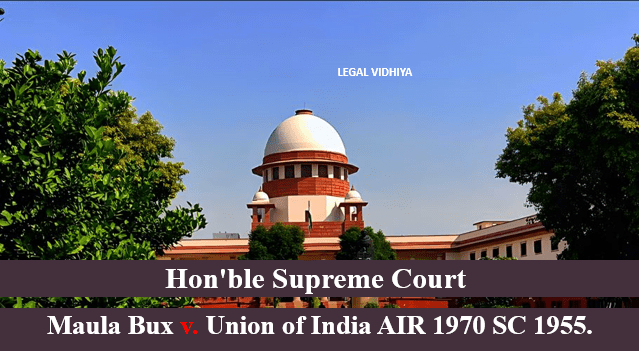
| CITATION | 1970 AIR 1955 1970 SCR (1) 928 1969 SCC (2) 586 |
| DATE OF JUDGMENT | 19th August,1969 |
| COURT | SUPREME COURT OF INDIA |
| APPELLANT | MAULA BUX |
| RESPONDENT | UNION OF INDIA |
| BENCH | Honorable Justice J.C. ShahHon’ble Justice Vaidyanathier RamaswamiHonorable Justice A.N. Grover |
INTRODUCTION
In this case, the plaintiff i.e. Maula Bux contracted to supply to Military Headquarters with potatoes, eggs and fish for one year and deposited an amount of Rs. 18500 as security for due performance of contract on the breach of contract, the Government forfeited the amount deposited by the plaintiff.
FACTS OF THE CASE
- The petitioner, i.e. Maula Bux, entered a contract no. C/74 with the Govt. of India on 20th February 1947 for the supply of potatoes at Military Headquarters, U.P. Area.
- He deposited an amount of Rs.10,000(Ten Thousand) as security for due performance of contract. On 4thMarch, 1947 another contract no. C/120 was made by him with the Govt of India for supply of poultry, eggs and fish at the same place stated above for one year and deposited another sum of Rs.8500(Eighty-Five Hundred) for due performance of contract.
- The Plaintiff failed to supply the regular commodities as agreed by him to the Govt. of India. Therefore Govt. of India rescinds the first contract on 23rd November 1947 and second 2nd December 1947 and gives up the amount deposited by plaintiff.
ISSUE RAISED
- Whether the Deposited money by the petitioner to be treated as the Earnest money in the contract?
- Whether the amount given by the Government of India comes under the actual damage or loss?
RATIO DECENDI OF CASE
The decree in favor of the plaintiff held that there was no sufficient evidence that proves the actual damage or loss to the other party in consequence of the default by the plaintiff.
The High Court was of the view that earnest money deposited as the security for the due performance of a contract does not make up any penalty under section 74 of the Indian Contract Act, 1872. Even security deposited in this case by stipulation of penalty, Government of India was entitled to receive reasonable compensation from the plaintiff not exceeding that amount whether actual damage or loss has been caused.
Further, the High Court observed that the Contract was for the supply of large quantities of potato, egg, poultry, and fish which would not be easily available in the market during the year 1947-48 which cause great inconvenience and takes judicial notice about the fact that it was the year when prices were rising and it would not be easy to buy the supply rates as contracted for. Therefore, the High Court stated it would not be unfair if we consider an amount of Rs.18,500 through damages not unreasonable. The High Court observed deposits made by the plaintiff may be treated as earnest money.
As observed by the judicial Committee in Kunwar Chiranjit Singh v/s Har Swarup.
“Earnest money is the part of the purchase price when the transaction goes forward: it is given up when the transaction falls through by fault or failure of vendee”
Therefore, the plaintiff had deposited the amounts claimed as security for guaranteeing the due performance of contracts. Such deposits cannot be treated as earnest money.
JUDGEMENT
The Trial was of the view that there was no sufficient evidence which proves that any loss or damage has been suffered by the Govt. of India in default by the plaintiff and on that account decrees in favor of the plaintiff and security was not held liable to be given up. Further, the decision of the High Court in appeal by the Union of India it was decided that they consider an amount of Rs. 18,500 /- through damages received by Govt. of India was not unreasonable.
CONCLUSION
There was a special leave filed by the petitioner against the decision of the High Court. The Honorable Supreme Court also observed that Union has failed to establish any evidence that they suffered any damage or loss which arose out of the default committed by the plaintiff. In this view, the High Court was in error disallowing the plaintiff’s case. Therefore, we set aside the decree passed by the High Court and substitute the following decree. The Union of India pays to the plaintiff the amount of Rs. 18,500/- with an interest rate of 3% per annum from suit till payment. The plaintiff was also guilty of a breach of contract and they are of the view that each party bears its own cost throughout.
REFERENCE
This Article is written by Akshita Srivastava student of Lloyd Law College CCSU; Intern at Legal Vidhiya.




0 Comments